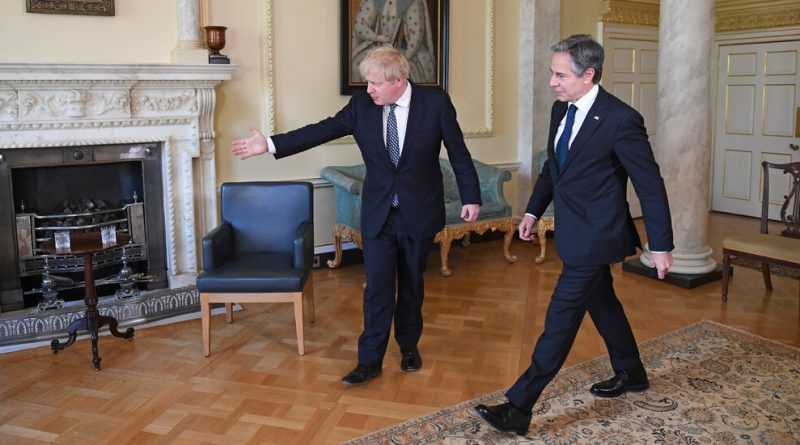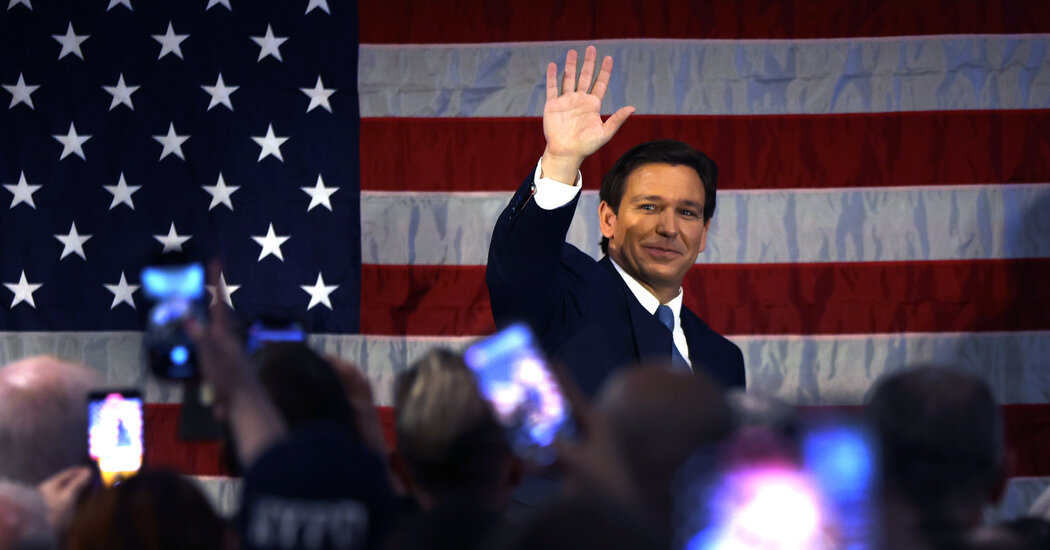Blinken and G-7 Allies Turn Their Focus to ‘Democratic Values’
LONDON — The Group of 7 was created to help coordinate economic policy among the world’s top industrial powers. In the four decades since, it has acted to combat energy shortages, global poverty and financial crises.
But as Secretary of State Antony J. Blinken meets with fellow Group of 7 foreign ministers in London this week, a key item on the agenda will be what Mr. Blinken called, in remarks to the press on Monday, “defending democratic values and open societies.”
Implicitly, that defense is against China and, to a lesser extent, Russia. While the economic and public tasks of recovering from the coronavirus remain paramount, Mr. Blinken is also employing the Group of 7 — composed of the United States, Britain, Canada, France, Germany, Italy, and Japan — to coordinate with allies in an emerging global competition between democracy and the authoritarian visions of Moscow and Beijing.
One twist in the meeting this week is the presence of nations that are not formal Group of 7 members: India, South Korea, Australia and South Africa. Also in attendance is Brunei, the current chair of the Association of South East Asian Nations.
It is no coincidence that those guest nations are in the Indo-Pacific region, making them central to Western efforts to grapple with Beijing’s growing economic might and territorial ambition. China was the subject of a 90-minute opening session on Tuesday morning, and the schedule concluded with a group dinner on the Indo-Pacific.
“The broader context for these meetings is China, and the authoritarian challenge that China presents to the democratic world,” said Ash Jain, a senior fellow at the Atlantic Council.
Mr. Jain noted the way the group is now emphasizing common values over shared economic interests. “The G-7 is being rebranded as a group of like-minded democracies, as opposed to a group of ‘highly industrialized nations.’ They’re changing the emphasis,” he said.
Many of the countries represented at the meeting do big business with China and Russia, complicating efforts to align them against those nations. China’s pattern of economic coercion was one specific topic of conversation on Tuesday, participants said.
But those efforts have been simplified by the departure of President Donald J. Trump, who repeatedly picked fights with Group of 7 allies and confounded them with calls to restore Russia, which was expelled in 2014 from what was then the Group of 8 after its annexation of Crimea from Ukraine.
Nor is it likely a coincidence that the expanded guest list matches, with the additions of South Africa and Brunei, a group of 10 countries and the European Union, collectively short-handed as the “D-10” by proponents of organizing them in a new world body. Those proponents include Prime Minister Boris Johnson of Britain, the host of this week’s gathering and architect of its guest list.
Mr. Johnson has also invited India, Australia and South Korea to send their heads of state to this summer’s Group of 7 summit in Cornwall, citing his “ambition to work with a group of like-minded democracies to advance shared interests and tackle common challenges.”
President Biden has similarly suggested that the world is grouping into competing camps, divided by the openness of their political systems. In his address to Congress last week, Mr. Biden said that “America’s adversaries, the autocrats of the world, are betting” that the nation’s battered democracy cannot be restored.
And Wednesday’s agenda for the gathering includes a session on open societies, including issues of media freedom and disinformation. Other sessions over the two days include Syria, Russia and its neighbors Ukraine and Belarus, Myanmar, and Afghanistan.
Some Group of 7 nations are concerned about the creation of a new global body that might contribute to a Cold War-style polarization along ideological lines.
In a joint news conference on Monday, Mr. Blinken and his British counterpart, Dominic Raab, were cautious not to suggest that they were forming a new club.
Asked whether a new “alliance of democracies” might be emerging, Mr. Raab said he did not see things in such “theological” terms, but did see a growing need for “agile clusters of like-minded countries that share the same values and want to protect the multilateral system.”
Addressing the same question, Mr. Blinken was careful to insist that this week’s meetings did not amount to plotting against Beijing.
“It is not our purpose to try to contain China, or to hold China down,” Mr. Blinken said. “What we are trying to do is to uphold the international rules-based order that our countries have invested so much in over so many decades, to the benefit, I would argue, not just of our own citizens, but of people around the world — including, by the way, China.” (The line is not just for public consumption. U.S. diplomats have relayed the same message privately, almost verbatim, to foreign counterparts.)
“I think that over time, China believes that it can be and should be and will be the dominant country in the world,” Mr. Blinken said. China is challenging the international order, he said, adding that “we’re going to stand up and defend it.”
“It is always a pain, from a governmental perspective, to invent a new forum, because you need to have an endless discussion about who’s in and who’s out, and how it works, and its relationship to the U.N.,” Mr. Shapiro said.
He added that the Group of 7, whose mission had grown nebulous in recent years, may have acquired a new sense of purpose as it tries to organize a post-Trump democratic world in the face of Chinese and Russian threats.
“You would be hard-pressed to look back the past five years or more since they kicked out Russia to name a single thing the G-7 has done of interest,” Mr. Shapiro said. “It didn’t have much to do.”



